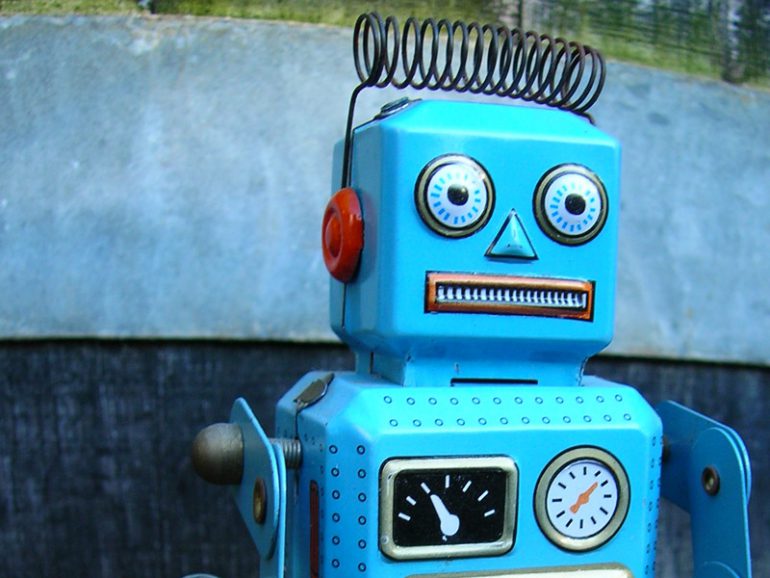This year’s big media theme is that we human workers will be replaced by robots and AI (Artificial Intelligence). Computers are efficient and unsentimental, work reliably and without pay 24x7x365. We have entered the age of convergence, exponential change the product of multiple overlapping developments in science and technology, with new machines designed by other machines. If the future of work to be automated, why bother with education? Will our final act be to put a collective permanent ‘Out of the Office’ message on the email system?
This post was co-contributed by Brian Bailey and Alex Page from the FASS Teaching and Technolgy Innovation team.
Much of this recent conjecture can be traced back to a 2013 research paper by Carl Benedikt Frey and Michael Osborne, which considered the susceptibility of particular jobs to computerisation and automation, and which estimated that about 47% of total US employment is ‘at risk’.
Numerous experts, panels, and think-tanks have joined the debate, including The World Economic Forum, the OECD, McKinsey, and Australia’s Data61, and in many cases these commentators have landed on the side of machine-driven disruption.
A more conservative interpretation of the literature suggests ‘only’ about 10% of existing jobs are likely to be eradicated, with up to 50% of all other roles experiencing significant disruption. It’s argued that new jobs will emerge, as they have with all previous major technology revolutions.
Both lines of thinking suggest there will be significant structural dislocation; put simply, the people getting the new jobs will generally not be the people losing the old ones.
…there are human qualities with which robots and AI cannot truly compete. They can only augment our humanity…
As has been noted elsewhere, the future is not set. Computers will more likely continue to augment humans in the workplace, rather than remove them. Computers remain machines, and while they are fast, great at repetition, can reliably handle large volumes of data, and recognise certain types of patterns, there are human qualities with which robots and AI cannot truly compete. They can only augment our humanity.
The future of work is uncertain, and that raises questions about education. Economic and career uncertainty, the cost of study, and the arrival of digital information sources such as Google, Wikipedia, MOOCs (and more), have sparked a much-needed debate about the role of education. Computer-based automation is real, and the problem is complex. Change is coming and educators share the burden of helping understand our future reality, not as an existential crisis, but as a call to arms. Or perhaps a call to books (hard copy and/or digital).
The University of Sydney is ahead of the exponential curve with the identification and adoption of a set of graduate qualities that explicitly address those human factors that will ensure we remain in charge of the machines, rather than the other way around.
By focusing our energies on human foundational skills, students – tomorrow’s leaders, workers, artists and thinkers – will need to be able to adapt to these emerging changes. We can help prepare for this uncertain future by reimagining and reinterpreting the deep disciplinary expertise of the University’s courses, through the lenses of the new graduate qualities, the embedding of critical thinking, problem-solving, communication, digital literacy, and inventiveness, into every aspect of the curriculum and student experience.
We are already beginning to implement these changes, such as through curriculum visualisation and storyboarding design of courses – old and new – ‘from the ground up’, to ensure constructive alignment and the achievement of the graduate qualities. For example, innovative programs such as Interdisciplinary Impact (FASS3999) push students to work together to solve real-world problems and use creativity combined with knowledge obtained throughout their degrees. Also, we are building a greater capacity for university partnerships with the private, public, and not-for-profit sectors in course delivery.
Helping students develop a professional, ethical, and personal identity through the embracing of these graduate attributes will ultimately equip them with the tools to win the future.
Helping students develop a professional, ethical, and personal identity through the embracing of these graduate attributes will ultimately equip them with the tools to win the future. To truly get to grips with this complex problem, we need to start sharing the conversation with colleagues and students. Let’s continue to develop the ability for graduates to influence and shape a future where we can fill the leisure time that could result from automation from the position and perspective of plenty, and not from poverty.
Michael A. Osborne spoke to his research on the Future of Employment at the University of Sydney in the 2016 Templeton Lecture. Osborne talked about the importance of education in determining the prospects of future generations. He wouldn’t be drawn on speculating on the future, wishing for his research only to encourage others to seek answers, particularly in the social sciences.
Seeking answers for the future. That sounds like an invitation too good to miss.





